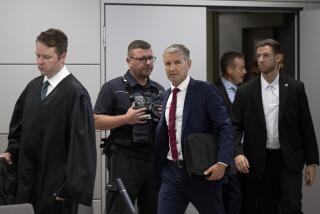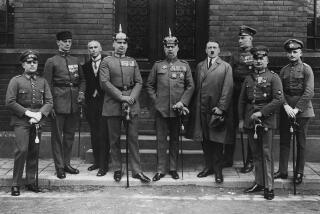Honecker Trial Stalled by Ex-Official’s Absence : Germany: Former East German Premier Willi Stoph is reported ill. Six are defendants in Berlin Wall slayings.
- Share via
BERLIN — The long-awaited trial of former East German leader Erich Honecker and five of his most senior aides opened here Thursday but was abruptly adjourned amid confusion after less than an hour when one of the defendants failed to appear.
Instead of his appearing personally, defense lawyers for former East German Premier Willi Stoph went to the court, carrying a certificate from his doctor saying he had suffered a mild heart attack Monday and was unable to leave his east Berlin home.
“We only found out about his condition this morning, when he didn’t show up,” said Bruno Rautenberg, the court’s chief spokesman.
After retiring briefly to consider the development, Chief Judge Hansgeorg Braeutigam announced an immediate adjournment, pending a medical examination of Stoph by a court-appointed lawyer. The exam is expected to be carried out today or over the weekend.
Legal officials at Berlin’s main courthouse in Moabit indicated that both Stoph and another co-defendant, Erich Mielke, former head of East Germany’s infamous security police, might be tried separately if their poor health seems likely to hamper the proceedings.
Mielke, who is 84 and in failing health, is already standing trial on charges that he killed a Berlin policeman in a 1931 street brawl in the most tumultuous days of Germany’s ill-fated Weimar Republic. Court-appointed physicians had concluded that he is strong and alert enough to follow only two, two-hour sessions per week.
Doctors say Honecker has liver cancer and have given him six to 18 months to live.
All six men are charged with manslaughter in connection with the deaths of 13 of the estimated 200 East Germans who were shot as they tried to flee across the Berlin Wall or the heavily fortified frontier that separated the two German states for much of the Cold War.
The number of cases was reduced to 13 from an original 75 in hopes that the trial might be concluded more quickly, possibly within a year.
The case also includes six co-prosecutors, mainly relatives of the 13 victims. Karin Gueffroy, whose son Chris, 20, was the Berlin Wall’s last known victim in February, 1989, was in court Thursday.
The trial marks the first time that an entire group of leaders from a former East Bloc Communist state have been brought before a court. So far, only two East Bloc leaders have been tried. Romania’s Communist leader Nicolae Ceausescu was executed after a summary, secret trial in December, 1989, and Bulgaria’s party boss, Todor Zhivkov, was sentenced in September to a seven-year jail term for misuse of power and embezzlement.
Besides Honecker, Stoph and Mielke--once the three most powerful men in East Germany--former East German Defense Minister Heinz Kessler, former Deputy Defense Minister Fritz Streletz and Hans Albrecht, a onetime regional party leader, are charged with manslaughter in connection with the same 13 deaths.
The charges against them stem from documents authorizing the use of force to halt anyone trying to flee the country, but are specifically tied to a May, 1974, decision taken at a meeting--allegedly attended by all six men--of the East German National Defense Council. It stated, in part, “The ruthless use of firearms must continue to be applied in response to illegal attempts to cross the border.”
The trial is expected to ease criticism leveled at the Bonn government that former East German border guards have been given jail sentences in connection with frontier shootings, while those who shaped the shoot-to-kill policies and gave the orders remained free. So far, the only East German leaders to face trial were relatively minor figures sentenced for less serious crimes, including corruption and election fraud.
Honecker was returned to Germany last July from Moscow, only after enormous pressure from Chancellor Helmut Kohl on Russian authorities. Honecker fled to Moscow last March to avoid arrest in Germany and eventually sought refuge in the Chilean Embassy there. Although said to be seriously ill with a fist-sized liver tumor, Honecker, 80, appeared slightly drawn but otherwise alert Thursday as he made a brief court appearance with the other defendants.
While opinion polls show a majority of Germans believe it right that Honecker was returned to Germany for trial, the conditions under which he is being tried makes a conviction less than automatic. Under terms of unification, all East Germans charged after unification for crimes committed in the Communist era must be tried under East German law, as it existed at the time.
Sources close to the prosecution explained Thursday that the state’s case rests mainly on the claim that the hard-line May, 1974, National Defense Council decisions violated both the border-control law at the time and other East German and international laws guaranteeing personal and basic human rights.
But many legal experts believe it is fiction to pretend that in a dictatorial Communist state, the decision of six of its most powerful leaders was anything less than de facto national law.
“One thing is certainly clear,” noted Honecker’s main defense lawyer Friedrich Wolff. “In East Germany, under East German law, Honecker would never have been put before a court because of shooting at the wall. That this is being done after the collapse of the East German state is purely political.”
Four trials so far this year involving several former East German border guards in connection with shooting incidents at the wall have brought contradictory, sometimes surreal judgments. One judge, for example, convicted four guards, saying they should have ignored the standing order to shoot because it was a violation of basic human rights; another judge decided that the East German order itself was not illegal but that the defendants in the case were guilty because they exceeded its spirit by unleashing long, sustained bursts of automatic weapon fire.
More to Read
Sign up for Essential California
The most important California stories and recommendations in your inbox every morning.
You may occasionally receive promotional content from the Los Angeles Times.













